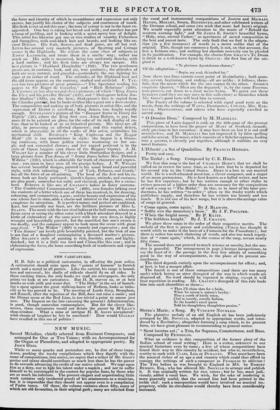" Come again, come again." By J. BLEWITT.
" Softly o'er the mountain's brow." By J. F. POULTER.
" When the bright moon." By P. KLITZ.
" The faithless knight." By J. T. CRAVEN.
• We place these songs•in the order of their respective merits. The melody of the first is joyous and exhilarating (FIELD has thought it worth while to make it the basis of a Fantasia for the Pianoforte) ; but there is rather too much clattering of words, and also too much repeti- tion of " come again," which, in the course of the song, occurs nearly fifty times.
The second does not pretend to much science or novelty, but the mo- tive is graceful. The arrangement in page 5 betrays inexperience to say the least of it : the passage in the first line admits of something good in the way of accompaniment, in the place of its present un- couthness.
The third depends entirely upon the accompaniment for effect; and, at best, is but a meagre affair. The fourth is one of those compositions (and there are too many such) which betray an utter disregard of the way in which words are disposed of. No word should be repeated in singing, except it will bear repetition in reading. Mr. CRAVEN'S disregard of this rule leads him into such absurdities as these-
" Then I'll claim thee for a bride
When 'tis nature's, nature's heyday:
Thus a youth of lordly mien,
Clad in courtly, courtly fashion,
To the hamlet's rural' queen
Told his thoughtless, thoughtless passion."


























 Previous page
Previous page